Introduction:
In today’s world, online booking platforms have revolutionized the travel industry, making it easier for people to book their travel needs from the comfort of their homes. Expedia Group is one of the leading online travel agencies in the world, connecting travelers with a wide range of travel options. Recently, the company made an announcement that it was expanding its business-to-business (B2B) portfolio in the Asia Pacific (APAC) region. In this blog, we will discuss the initiatives that the company is taking to strengthen its B2B portfolio across the Asia Pacific region.
Introduction of Expedia TAAP:
Expedia TAAP (Travel Agent Affiliate Program) is a platform through which travel agents can access Expedia Group’s extensive inventory of hotels, flights, holiday packages, and activities. With this platform, travel agents can tailor the travel needs of their clients and generate more revenue. Expedia has now introduced Expedia TAAP in Australia and New Zealand. The program has been designed to cater to the needs of small and independent travel agents who usually have challenges in accessing a wide range of travel options for their clients.
Partnership with Air Asia:
Air Asia is a leading low-cost airline in the Asia Pacific region, connecting over 150 destinations in the world. Expedia Group has partnered with Air Asia to offer its customers’ access to the airlines’ extensive flight network. With this partnership, travelers can access Air Asia’s inventory of flights via Expedia Group’s online platform. The partnership is aimed at offering travelers an enhanced travel booking experience with expanded choices of flights across the Asia Pacific region.
Accelerating cloud adoption in APAC:
Expedia Group has recently adopted a cloud-first approach to enhance its services and improve customer experiences across the region. The company has moved its technology infrastructure to Amazon Web Services (AWS) cloud. AWS is one of the leading cloud service providers globally, with a presence in the Asia Pacific region. With this approach, Expedia can deliver a better experience for its customers by improving the scalability and flexibility of its platform. The company has also embraced the use of machine learning and artificial intelligence (AI) to enhance its customer experiences.
Targeting smaller and independent hotels:
Expedia Group has also introduced an initiative aimed at benefiting smaller and independent hotels in APAC. The company has launched a platform known as Expedia Group PartnerCentral. The platform offers smaller and independent hotels access to professional tools that they can use to reach a wider audience. The platform also provides real-time updates on bookings and access to customer insights, which can help hotel owners tailor their services to meet the changing needs of their customers.
Enhancing customer service:
Expedia Group has taken various measures to enhance customer service satisfaction, including opening a call center in Singapore. The call center aims to provide dedicated services to Expedia’s customers in the Asia Pacific region, offering support for bookings, cancellations, and other queries. With this initiative, customers have access to trained professionals who can address their issues promptly, helping them to enjoy a hassle-free travel experience.

Conclusion:
As we can see, Expedia Group is taking significant steps to strengthen its B2B portfolio across the Asia Pacific region. From the introduction of Expedia TAAP to partnerships with low-cost airlines like Air Asia, Expedia Group is committed to offering enhanced travel booking experiences for its customers. The initiatives will benefit travel agents, smaller and independent hotels, and travelers across the region. With these initiatives, the company is set to make a significant impact on the travel industry in the region.